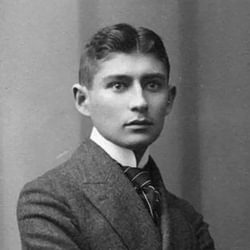A Fratricide
It has been established that the murder took place in the following ways:
Schmar, the murderer, lined up at nine o'clock in the evening on the moonlit night on the corner where Wese, the victim, had to turn from the alley in which his office was located into the alley in which he lived.
Cold night air, shivering through everyone. But Schmar had only put on a thin blue dress; the skirt was also unbuttoned. He didn't feel cold; he was also constantly on the move. He always held his murder weapon, half bayonet, half kitchen knife, completely exposed. Looked at the knife against the moonlight; the edge flashed; not enough for Schmar; he struck her on the bricks of the pavement so that there were sparks; maybe regretted it; and in order to make good the damage, he stroked the sole of his boot like a violin with her, while, standing on one leg, leaning forward, at the same time listening to the sound of the knife on his boot, at the same time listening to the fateful side street.
Why did the private Pallas tolerate all this, who was watching everything from his window on the second floor nearby? Explore human nature! With his collar turned up, his dressing gown belted around his body, and shaking his head, he looked down.
And five houses down, diagonally across from him, Frau Wese, in fox fur over her nightgown, looked like her husband, who was hesitating for an unusually long time today.
Finally the doorbell rings in front of Weses office, too loud for a doorbell, across the city, up to the sky, and Wese, the hard-working night worker, steps out of the house there, still invisible in this alley, only announced by the bell; the pavement is about to count its quiet steps.
Pallas leans far forward; he mustn't miss anything. Mrs. Wese closes her window with a clink, reassured by the bell. But Schmar kneels down; since he has no other nakedness at the moment, he only presses his face and hands against the stones; where everything freezes, Schmar glows.
Just at the border that separates the streets, Wese stops, only with a stick does he support himself in the street on the other side. A whim. The night sky attracted him, the dark blue and the gold. Unknowingly he looks at it, ignorantly he strokes his hair under his raised hat; nothing comes together up there to show him the very near future; everything stays in its nonsensical, inexplicable place. In and of itself very sensible that Wese should go on, but he goes into the knife of the Schmar.
"Wese!" Shouts Schmar, standing on tiptoe, arm stretched out, knife sharply lowered, "Wese! Julia waits in vain! ' Slashed water rats make a sound similar to Wese.
"Done," says Schmar, and throws the knife, the superfluous bloody ballast, against the next house front. “Bliss of Murder! Relief, inspiration from the flow of the strange blood! Wese, old nightshade, friend, beer bank mate, seeping into the dark street. Why aren't you just a bladder filled with blood that I sit on you and you disappear completely. Not everything is fulfilled, not all blooming dreams ripened, your heavy rest lies here, already inaccessible to every step. What's that mute question you're asking? "
Pallas, choking all the poison in his body, stands in his double-leafed front door. “Schmar! Rubbish! Noticing everything, not overlooking anything. ”Pallas and Schmar examine each other. Pallas satisfies it, Schmar never comes to an end.
Frau Wese, with a crowd on both sides, rushes over, her face quite aged with horror. The fur opens, she falls over Wese, the body in nightgown belongs to him, the fur that closes over the couple like the lawn of a grave belongs to the crowd.
Schmar, grappling with the last of the nausea, his mouth pressed to the policeman's shoulder, who lightly leads him away.
Literary icon whose "Kafkaesque" works, like "The Metamorphosis," probe alienation and existential absurdity.
